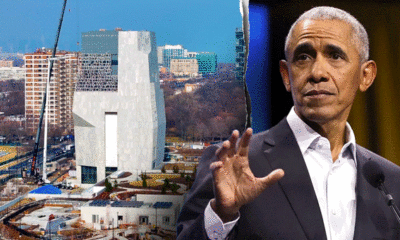Illinois
Feds say more than 1,500 arrested in

The Department of Homeland Security has said federal agents have made more than 1,500 arrests as part of the immigration crackdown in the Chicago area dubbed “Operation Midway Blitz,” which began more than a month ago.
CBS News Chicago has been digging into federal data to find out exactly who is being arrested and if those numbers really line up.
In response to a Freedom of Information Act request filed months ago, asking for the names and numbers of people who’d been arrested by U.S. Immigration and Customs Enforcement in Chicago, ICE referred CBS News Chicago to a data dashboard that tells a pretty interesting story.
The website shows the arrests cover not just people arrested in the Chicago area, but all of Illinois, Indiana, Wisconsin, Missouri, Kentucky, and Kansas – the six states covered by ICE’s Chicago field office.
ICE said, between Jan. 1 and Sept. 30 – the last day they were able to update the portal before the federal government shutdown – they’ve arrested 2,011 people, detained 1,469 of those individuals, and have removed (deported) 1,044 of those arrested.
The removal numbers lag behind previous years, with 3,266 removed during the same time period last year, 2,392 removed during that time in 2023, 1,645 removed in the same time period in 2022, and 1,799 removed in that time in 2021.
The website indicates the data is updated quarterly, and is sorted by year. ICE noted the data could fluctuate until “locked” at the end of December.
Confusing, given a tweet by Border Patrol Chief Greg Bovino saying DHS has made more than 1,500 arrests with “more to come!”
Erendira Rendon is the chief program officer at The Resurrection Project, which has been helping families find legal assistance amid the ICE crackdown, and has been keeping their own numbers on arrests.
“What we saw in September was our highest month, with 337 individuals requesting legal assistance, and in the month of October we will have already reached – even though we’re only midway through – 190 requests for assistance,” she said.
Rendon also said the feds are now subjecting nearly everyone arrested during the immigration crackdown to mandatory detention, meaning they will be held for the remainder of their immigration case, rather than allowing some of them to be released on bond.
“Previously, we would be able to go over to court, demonstrate that the individual is of good moral character, demonstrate that the individual would continue their deportation case outside of detention, and we would be able to receive bond,” Rendon said.
Meantime, the clock is ticking at the ICE facility in Broadview, where a federal judge has ordered the feds to take down a fence before midnight Tuesday night.
The fence was erected Sept. 23 outside the ICE facility on Beach Street in Broadview. For weeks, it has been a symbol of tension between federal authorities, protesters, and the Village of Broadview itself.
Hours after it went up, the Broadview Fire Department demanded the Department of Homeland Security have it removed, saying it was built without a permit, and was blocking emergency responders’ access to that road.
The village later filed a federal lawsuit, and last week a judge ordered the fence removed by 11:59 p.m. Tuesday.

Illinois
Preserving history: Local group works to elevate stories of freedom seekers

A group of historians and educators is working to identify, preserve, and share the stories of freedom seekers who traveled through the Underground Railroad in Illinois.
The project comes amid efforts to erase or water down Black history, including recent actions by the National Park Service under the Trump administration. Last month, the National Park Service removed an exhibit in Philadelphia about nine people enslaved by George Washington. A federal judge ordered the exhibit to be restored. The Trump administration has appealed that ruling. In September, a photo showing an enslaved man’s scarred back from whippings was removed from a national monument in Georgia.
Members of the “Illinois Network to Freedom Collective” are focused on bringing attention to the stories of freedom seekers and sites connected to the Underground Railroad in Illinois.
According to the National Park Service, there are 28 recognized “Network to Freedom” sites in the state, including Graceland Cemetery and the Ton Farm site in Chicago.
Abdul Alkalimat, a member of the collective, said, “We found at least 429 places in Illinois that were directly connected to the Underground Railroad.”
The group is working to uncover and document these locations by analyzing written records, church documents, census data, and oral histories.
“We think the real story is the freedom seekers, the people who were daring enough to escape from slavery,” said Alkalimat.
Eric Krupa, curator and archivist at the St. Charles History Museum, recently helped add the Joseph Bartlett Farm in Kane County to the National Park Service’s list of recognized safehouses.
“This site is actually where Celia and Eliza were taken to,” said Krupa, referring to two freedom seekers whose journey passed through the area.
Krupa said there is evidence connecting another home in St. Charles to the same story, and he is working to get that home nationally recognized as well.
Larry McClellan, a historian with the collective, explained the challenges of researching this history.
“So, to begin with, this (the underground railroad) is all illegal, so what we have to do is find all kinds of ways to get into the information, and so we end up with family records, with church records, with census records,” said McClellan.
Alkalimat added, “There’s a lot of oral history. There’s a lot of family documentation.”
The collective’s work is not only about research, but also about public education.
“It’s getting the resources, the imagery, the narratives, the stories, those things that help students and teachers come alive in classrooms that bring those feelings up in classrooms,” said Asif Wilson, an educator and member of the group.
McClellan said, “There are efforts going on around the state, and having the commission will help us pull those efforts together in terms of developing curriculum, developing standards and guidelines.”
The group hopes that by teaching this history, they can inspire progress in the ongoing fight for civil rights.
“The Underground Railroad is an important aspect of the past, but we have to embrace the legacy of the freedom seekers all the way through the current time we live in today,” said Alkalimat, “Since we’ve arrived here, we’ve always found ways to build new home, place, to build new lives, to resist that oppression, and I hope to bring those legacies and those memories to folks who might not have them because we exist in a time and place right now where it seems like the world is literally on fire,” said Wilson, “We really need these moments to reconcile the past and what the past might mean for the future.”
The collective came together about a year ago, but Historians Glennette Turner and Larry McClellan have been doing this work for decades. They say the new collaborative project gives them hope.
“Part of why we’re so excited about the new collaborative is really completing the work that we started so long ago,” said McClellan.
Turner said, “I’m 92 years old, and I knew I wouldn’t live forever and just, you know, be able to continue this. It’s just so encouraging. It just means everything is going to be in good hands going forward.”
Last summer, Illinois passed the “Illinois Freedom Trails Commission Act,” which aims to explore, research, and commemorate the journeys of freedom seekers. Several members of the collective helped draft the legislation and are now working with the state. The official commission has yet to be announced and will be appointed by the governor.
Illinois
Illinois Lottery player wins $1.15M off ticket purchased in Chicagoland

CHICAGO – An Illinois Lottery ticket worth $1.15 million was sold at a convenience store in far northwest suburban Harvard over the weekend.
What we know:
The winning Lucky Day Lotto ticket was purchased at Chemung Country Store, located at 24102 Route 173, for the Saturday evening drawing.
The winning numbers were 2-15-28-31-43.
What they’re saying:
Mark Smith, co-owner of Chemung Country Store, said the shop has been part of the community for nearly four decades.
“Our customer base is largely made up of loyal, local customers, so we’re all hoping the winner is one of our regulars,” Smith said in a statement.
For selling the jackpot-winning ticket, the store will receive a bonus equal to 1% of the prize — $11,500.
“Over the years, we’ve celebrated quite a few winners, but this is one of our biggest,” Smith said, adding most of the bonus will go back into business and some will be used to reward staff for their work.
Big picture view:
Nearly 74,000 winning tickets were sold statewide in Saturday evening’s Lucky Day Lotto drawing, totaling more than $1.3 million in prizes.
Winners have one year from the draw date to claim their prize. The Illinois Lottery encourages winners to sign the back of their ticket and keep it in a safe place until they are ready to claim it.
Lucky Day Lotto is an Illinois-only game with drawings held twice daily at 12:40 p.m. and 9:22 p.m. Jackpots start at $100,000. Tickets can be purchased in stores, online or through the Illinois Lottery app.
The Source: The information in this story came from the Illinois Lottery.
Illinois
1 injured, 1 dead of self-inflicted gunshot in domestic incident in Des Plaines, Illinois

Police in the northwest Chicago suburb of Des Plaines, Illinois on Sunday were investigating a domestic incident in which one person was injured and another died of a self-inflicted gunshot wound.
At 11:15 p.m. Saturday, Des Plaines police were called for a domestic incident in the 600 block of Jill Court. Upon arrival, officers found out a domestic incident between two people had become physical, and one of those two people suffered non-life-threatening injuries.
This person was taken to an area hospital. The nature of the person’s injuries was not specified.
Around 11:50 p.m., police in neighboring Park Ridge were called for a report of a suspicious vehicle in the 800 block of Meacham Avenue. They found someone in the car who had fled the domestic incident in Des Plaines and had then suffered what appeared to be a self-inflicted gunshot wound and died, police said.
Further information was not released Sunday.
-

 Montana4 days ago
Montana4 days ago2026 MHSA Montana Wrestling State Championship Brackets And Results – FloWrestling
-

 Science1 week ago
Science1 week agoWhat a Speech Reveals About Trump’s Plans for Nuclear Weapons
-

 Oklahoma6 days ago
Oklahoma6 days agoWildfires rage in Oklahoma as thousands urged to evacuate a small city
-

 Technology3 days ago
Technology3 days agoYouTube TV billing scam emails are hitting inboxes
-

 Education1 week ago
Education1 week agoVideo: Secret New York City Passage Linked to Underground Railroad
-

 Politics1 week ago
Politics1 week agoChicago-area teacher breaks silence after losing job over 2-word Facebook post supporting ICE: ‘Devastating’
-

 Technology3 days ago
Technology3 days agoStellantis is in a crisis of its own making
-

 Movie Reviews1 week ago
Movie Reviews1 week agoAssi Movie Review: Hard-hitting, horrifying, and heartfelt, this courtroom drama is impossible to ignore























